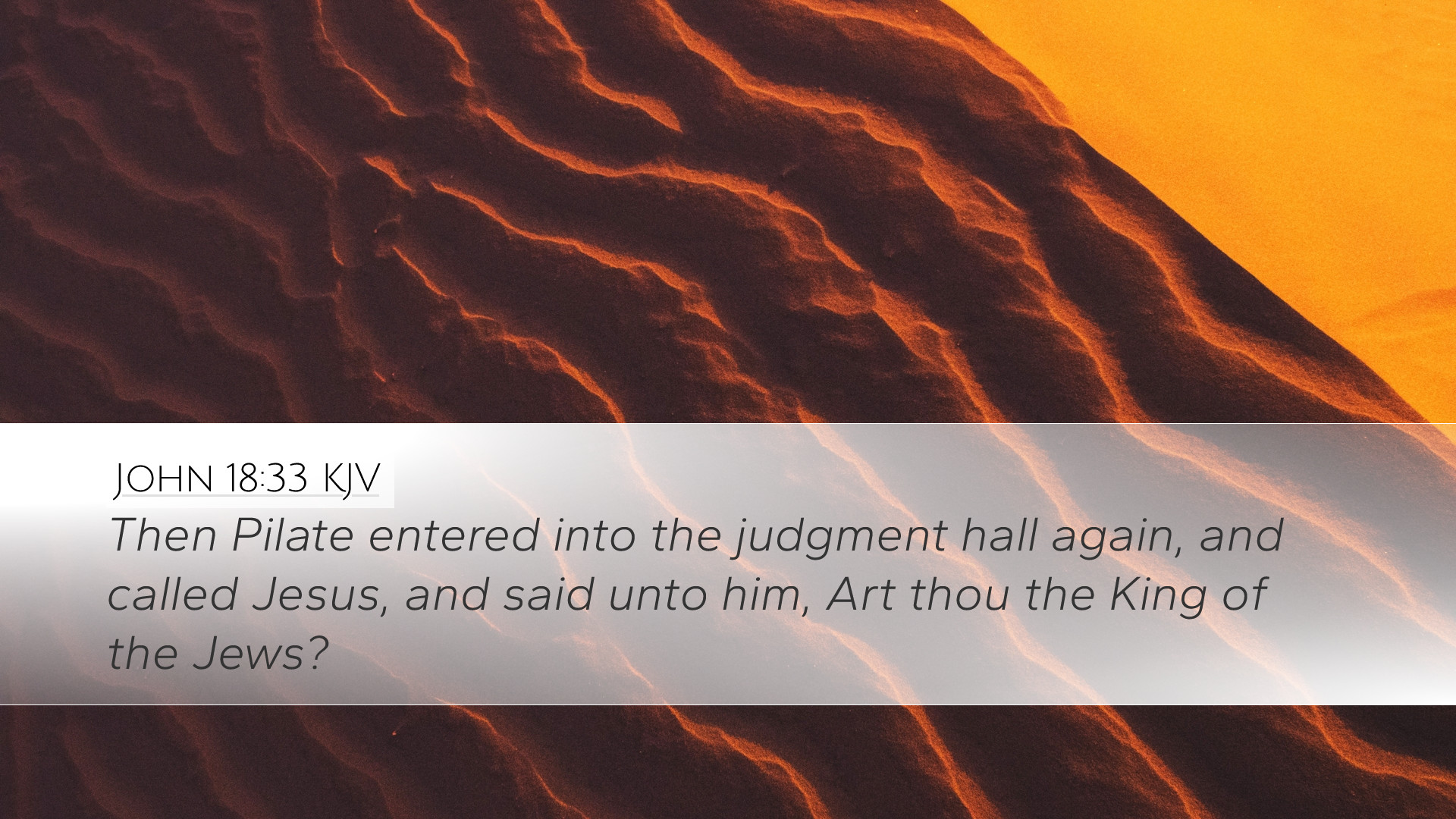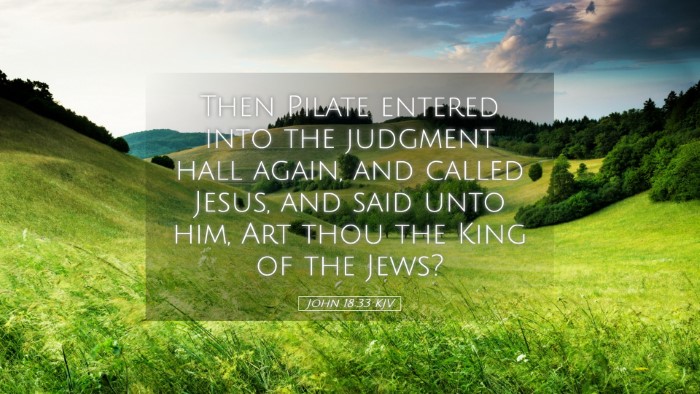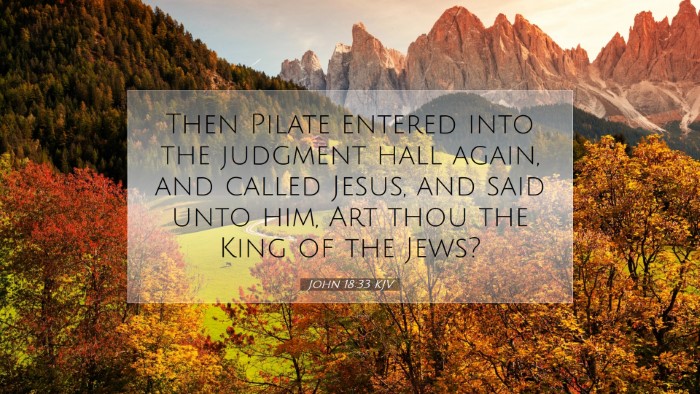Commentary on John 18:33
Verse Context:
In John 18:33, we find Jesus standing before Pilate, the Roman governor, after being arrested and brought to trial. This pivotal moment encapsulates the intersection of political power, divine sovereignty, and the nature of Christ's kingship. In the words of this verse, Pilate questions Jesus, asking, "Art thou the King of the Jews?" This inquiry sets the stage for profound theological truths about the kingdom of God and the identity of Jesus.
Matthew Henry's Insights
Matthew Henry emphasizes the significance of Pilate's question regarding Jesus' kingship. He notes that Pilate, representing worldly authority, is perplexed by the nature of Jesus' kingdom. Unlike earthly monarchs, who reign with force and coercion, Jesus' reign is characterized by humility and servanthood. Henry outlines that the question posed by Pilate reveals not only Pilate's misunderstanding of Jesus as a king but also the broader misunderstanding of the people who expected a political savior.
Henry further notes that Jesus’ response is critical. He acknowledges that His kingdom is not of this world, which underscores the distinction between divine and earthly power. This statement affirms that Jesus’ kingship transcends human understanding and is rooted in spiritual authority rather than temporal dominion.
Albert Barnes' Commentary
Albert Barnes provides an analytical perspective on Pilate's question and Jesus' reply. He explains that Pilate, representing the Roman Empire, had no comprehension of the spiritual implications of Jesus' kingship. For Barnes, this interrogation highlights the conflict between the kingdom of God and the political realities of the time. Jesus’ assertion that His kingdom is not of this world serves as a declaration of His divine purpose and mission.
Barnes also explores the implications of Jesus' kingship. By stating that His subjects are not of this world, Jesus indicates that His followers engage with a different set of values that seeks justice, mercy, and truth, contrasting sharply with the corruption often seen in earthly kingdoms. The essence of Jesus' reign is one of peace that transcends worldly conflict.
Adam Clarke's Examination
Adam Clarke delves into the historical and cultural context behind Pilate’s question. He notes that Pilate was likely aware of the unrest caused by Jesus’ claims and the potential threat to Roman authority. Clarke emphasizes that Pilate's inquiry was both political and personal; he wanted to understand whether Jesus posed a real threat to the Roman Empire.
Clarke continues by analyzing the term "king." He points out that Pilate’s understanding of kingship is rooted in earthly authority, power, and dominion. He argues that Pilate's perception reflects the dissonance between earthly rulers and divine kingship. Jesus’ response defies human expectations, revealing that His mission is not to establish a political kingdom but to offer salvation through His sacrificial death.
Theological Implications
Collectively, these commentaries underscore significant theological implications drawn from John 18:33. The question of kingship not only defines the relationship between Jesus and worldly rulers but also illuminates the nature of God’s kingdom:
- Spiritual vs. Temporal Authority: The dialogue highlights the distinction between spiritual authority and earthly power. Jesus’ kingdom is not recognizable by earthly standards, marking a fundamental shift in understanding the nature of authority.
- Challenge to Human Expectations: The expectation of a political savior is confronted by the reality of Jesus’ mission. While humanity often seeks immediate solutions through power, Christ presents a radical alternative focused on spiritual renewal.
- Nature of Christ's Reign: The essence of Jesus' rule is characterized by love, service, and truth. His kingdom expands through the transformative power of the Gospel, drawing people to Himself irrespective of their status or culture.
Pastoral Application
For pastors and church leaders, John 18:33 serves as a powerful reminder of the nature of Christ’s kingship and the values it embodies:
- Embrace the Values of the Kingdom: Encourages believers to embody the principles of Christ's kingdom—justice, love, and mercy—in their communities.
- Reassess Power Structures: Challenges leaders to evaluate their own approaches to leadership, focusing on servanthood rather than authoritarianism.
- Engage with the World: Calls for the church to engage meaningfully with societal issues, reflecting the character of Christ in every interaction.
Conclusion
In summary, John 18:33 invites readers into a deeper understanding of Jesus' identity and mission. The combined insights from Matthew Henry, Albert Barnes, and Adam Clarke provide rich theological exploration into the implications of Christ’s kingship in the context of worldly authority. The verse encourages a reflective and transformative engagement with the truth that Jesus' reign is not defined by earthly measures but by an everlasting commitment to truth and grace.


